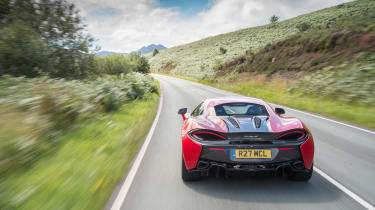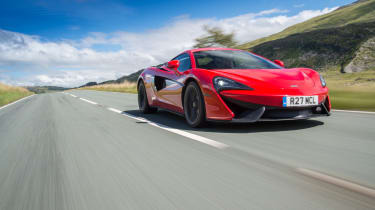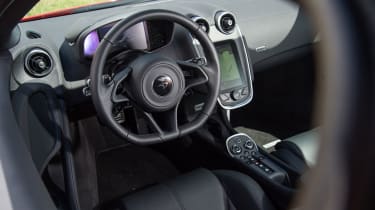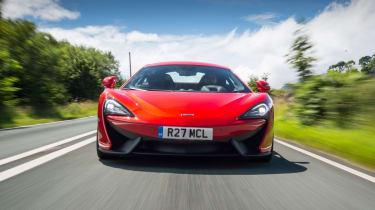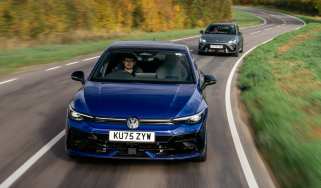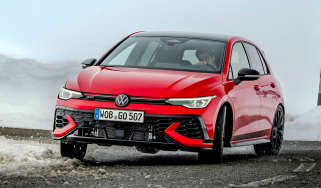McLaren 540C review – Can McLaren's cheapest car take on the Audi R8?
It may be McLaren's entry-level car, but the 540C is more than worthy of its supercar status
The 540C may well be McLaren’s most affordable, entry-level car but with a carbonfibre chassis, a 3.8-litre twin-turbo V8, 533bhp and a £126,000 price tag it’s hardly what you’d call basic. The 540C shares most of its architecture and its looks with its big brother the McLaren 570S, but it is less powerful, doesn’t come with carbon ceramic brakes as standard and fewer body panels are made from carbonfibre. Even so, the 540C is still just as exotic and as exciting as you’d want a supercar to be.
> Click here to read our review of the McLaren 570S
Technical highlights?
Listing all the technical aspects of a McLaren would, ordinarily, occupy a space worthy of a three-volume novel, the suspension alone making up half of that. But the 540C is part of McLaren’s Sport Series cars, and so isn’t fitted with the manufacturer’s trademark ProActive Chassis Control. Instead, the complex suspension system that hydraulically links the all of the dampers together has been replaced by conventional anti-roll bars.
The 540C’s chassis is far from old-school though, as it still has adaptive dampers that continually adjust to try to keep the ride comfortable and a degree of stiffness when cornering. The characteristics of the dampers can also be changed from Normal to Sport or Track with a dial on the centre console. Another, separate dial allows you to switch the engine to the same three settings too.
Engine, transmission and 0-60 time
The 540C is equipped with McLaren’s 3.8-litre twin-turbo V8. It’s the same engine that has, essentially, been in all modern McLarens since the 12C and including the P1, albeit without the hypercar's additional electric motor.
More reviews
In the 540C the engine makes 533bhp and 398lb ft of torque. Although that’s certainly a healthy amount it’s still 29bhp less than the 570S, 83bhp less than the old 12C and 133bhp less than the 675LT – all cars with fundamentally the same engine. Sadly, it isn’t just the numbers that are slightly disappointing; the engine doesn’t have the same ferocity in 540C as it does in other models. evo Road Test Editor, Dan Prosser recently tried the 540C against the 12C and came to this conclusion: ‘The 540C’s V8 is rather flat at the top, with a much less exciting soundtrack. If the 12C’s motor makes us realise that turbo engines don’t have to be uninspiring, the 540C’s reminds us they very often are’.
It may not be the most evocative engine, or be blessed with the greatest output, but the V8 in the 540C is definitely effective. It behaves in a distinctly turbocharged manner and below 3500rpm can seem sluggish. But then, once the needle has stretched further around the rev counter, the engine fires the 540C forward at an incredible pace. The whooshing sound that emanates from the turbos adds to the rush of acceleration making it truly thrilling. All thoughts that the 540C is just a ‘bargain’ McLaren disappear out of the window.
The 540C weighs just 1311kg, dry. This low weight helps the 540C accelerates to 62mph from a standstill in just 3.5sec and reaches a top speed that’s just shy of 200mph at 199mph.
The 540C is fitted with a seven-speed double-clutch gearbox. It isn’t an exceptional transmission; it’s neither impressively fast nor frustratingly slow and goes about its job in fuss-free and efficient way. What isn’t so pleasant is the 1990s computer mouse-style click the paddles make whenever you change gear.
What’s it like to drive?
As you lower yourself into the 540C it becomes immediately clear that McLaren know how to create the perfect driving environment. The seating position is low but windscreen scuttle is also low, and so forward visibility is fantastic. It isn’t quite so easy to see out the back but that only serves as an added reminder, not that you need it, that you’re in a mid-engined supercar. You sit close to the centre of the car, but every feature of the interior is slim and minimal so never feels cramped. The steering wheel can be adjusted to the ideal position and the brake pedal is perfectly aligned with your left foot…
It’s largely unnecessary to use your left foot to brake when driving on the road; we know that. But, the position and weighting of the brake pedal makes left foot braking far easier in the 540C than in most other cars. The linearity of the brakes also contributes to how easy they are to get accustomed to, regardless of which foot you’re braking with; with each millimetre of movement from the pedal the brakes bite proportionally more.
Being able to meter-out the perfect amount of braking, thanks to that long and progressive pedal, is really important in the 540C. Use too much force and the whole car squirms and skitters around. Be more subtle and erudite with your braking, linger on the pedal during turn-in and you can use the excitable rear axle to make 540C feel incredibly alert and agile.
The 540C doesn’t have the every-day robustness and usability that its rivals have, or that McLaren might promise. It does ride incredibly well, for a super car, but there are a lot of whines and clicks that would be filtered out in other premium cars. The steering constantly trembles in your hands and the 540C occasionally hunts out cambers and channels in the road. But any feeling of discomfort or frustration is immediately forgotten about as soon as you aim the 540C at a twisting road.
Over crests and through compressions the McLaren doesn’t pitch or dive and you can feel each axle working together to support and neutralise the car. With both axles taking the strain of the body over undulations the 540C feels composed all of the time and your confidence in the 540C grows with every metre you drive it.
With neither axle ever being agitated nor disturbed you never have to wait for the car to settle before you can really attack a corner. The McLaren stays flat as you turn in, pivoting around its centre and feeling unquestionably mid-engined. The steering that quivered in your hands in a straight line, now sends you a detailed description of what the front tyres are dealing with.
As you accelerate out of a corner, the steering frees up just slightly as the front tyres unload and you prepare for some mild understeer, but it never really happens. To replicate this sensation in most other modern cars, usually fitted with EPAS systems, the front tyres would already have given up and the car would be understeering, even if only slightly. Not in the McLaren: the steering keeps you so intently informed that you’re immediately aware of a potential loss of grip way before the front tyres have actually given up.
Sadly, you can’t establish the same level of intimacy with the rear axle. It’s far from being unruly, but you can’t control the rear wheels with the same precision that the steering and brakes give the front end. The engine’s delivery isn’t particularly linear and it can be difficult to feed the power in smoothly; the boosty nature of the engine, as thrilling as it might be, just doesn’t allow you to edge up to the limit of grip as you can with the front axle. As you accelerate the engine spikes and, unsurprisingly with 533bhp and 398lb ft of torque, the rear tyres sometimes break traction. It isn’t always easy to judge when that might happen, but when it does the chassis’ supreme control means the 540C remains remarkably manageable for a mid-engined supercar.
Price and rivals
The 540C, just like the more powerful 570S, has tough competition from Audi and Porsche. The 911 Turbo has the exact same power as the McLaren and only costs a fraction more at £126,925. However, despite having two more seats than the McLaren, and weighing 1595kg, the 911 Turbo can reach 62mph in 3.0sec. That’s, in part, due to it having four-wheel drive.
> Click here to read our review of the Audi R8
The 540C’s other close competitor is the Audi R8, it too has the same power as the 540C and 911 Turbo but the Audi is marginally cheaper at £119,520. The R8, like the Porsche, has four-wheel drive but it can’t match the 911 Turbo’s 0-62mph time. Instead it reaches 62mph in 3.5sec, the same as the McLaren. But the R8 has an incredible, naturally aspirated V10 engine that makes the most scintillating noise. As fast as the 911 is, and as wonderful as the R8’s engine is, neither offers the same level of connection and interaction that the 540C does.
